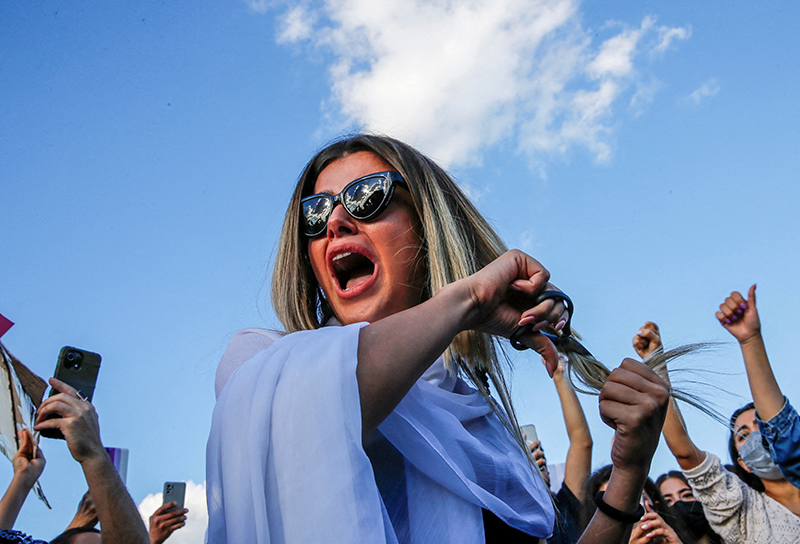Iranian security forces clashed with students at a prominent university in Tehran on Sunday, social and state media reported, in the latest sign of a deadly clampdown on nationwide protests that were ignited by the death in custody of a young woman.
The anti-government protests, which began at 22-year-old Mahsa Amini’s funeral on Sept. 17 in the Kurdish town of Saqez, have spiralled into the biggest show of opposition to Iran’s authorities in years, with many calling for the end of more than four decades of Islamic clerical rule.Activist Twitter account 1500tasvir, which has around 160,000 followers, posted several videos showing Sharif University, traditionally a hotbed of dissent, surrounded by dozens of riot police.
One of the videos showed security forces firing teargas to drive the students off the campus and the sound of what appeared to be shooting at a distance could be heard.
Another video showed security forces chasing dozens of students trapped in the university’s underground parking. The account said dozens of students had been arrested.
You have to watch it several times to understand how the Sharif University students are being arrested. At the end of the video, the security forces shoot the person who is filming.#مهسا_امینی #MahsaAmini #IranRevolution pic.twitter.com/Q8dn9GUyly
— 1500tasvir_en (@1500tasvir_en) October 2, 2022
Iranian state media described “reports of clashes” at the university and said the country’s science minister visited the campus to check on the situation.
Reuters could not independently verify the events at the university.
Students had been protesting at numerous universities on Sunday and demonstrations were held in several cities such as Tehran, Yazd, Kermanshah, Sanandaj, Shiraz and Mashhad, with participants chanting “independence, freedom, death to Khamenei,” earlier social media posts showed.
The protests have not abated despite a growing death toll and the crackdown by security forces using tear gas, clubs, and in some cases, according to videos on social media and rights groups, live ammunition.
Iran Human Rights, a Norway-based group, in a statement said that “so far 133 people had been killed across Iran”, including more than 40 people it said died in clashes last week in Zahedan, capital of the southeastern Sistan-Baluchistan province.
Iranian authorities have not given a death toll, while saying many members of the security forces have been killed by “rioters and thugs backed by foreign foes”. Last week state television said 41 had died, including members of the security forces.
Iran’s utmost authority Supreme Leader Ayatollah Ali Khamenei has not commented on the nationwide protests, which have spread to Iran’s 31 provinces, with all layers of society, including ethnic and religious minorities, taking part.
Amini’s death and the crackdown have drawn international criticism of Iran’s rulers, who in turn accuse the United States and some European countries of exploiting the unrest to try to destabilise the Islamic Republic.
Iranian state media shared a video of pro-government students, who gathered at the Ferdowsi university in Mashhad, chanting “the Islamic Republic is our red line”.
Earlier on Sunday, Iranian lawmakers chanted “thank you, police” during a parliament session, in a show of support for a crackdown on widespread anti-government protests.
DEATH IN COMA
Amini was arrested on Sept. 13 in Tehran for “unsuitable attire” by the morality police who enforce the Islamic Republic’s strict dress code. She died three days later in hospital after falling into a coma.
The lawyer for Amini’s family, Saleh Nikbakht, told the semi-official Etemadonline news website that “respectable doctors” believe she was hit in custody. Amini’s autopsy report and other medical details have not been released, but her father said he saw bruises on her leg and that other women detained with her said she was beaten.
Iran’s police authorities say Amini died of a heart attack and deny she was beaten to death in custody.
The country’s hardline President Ebrahim Raisi has ordered an investigation into Amini’s death. He said last week that a forensic report would be presented in “coming days”.
Amnesty International on Friday reported that hundreds were injured and thousands have been arrested in the protests.
State media said at least 20 people were killed in the Zahedan clashes, blaming a separatist group from the Baluchi minority for starting a shootout in the city.
Islamic Republic oppressive forces opening fire at Sharif Uni students inside the campus.
Firing tear gas, live ammo and pellets. They have trapped the students, not letting them out.
Many have been arrested.
Students requesting help to be rescued.#مهسا_امینی #IranTruth pic.twitter.com/ldNnR6g8xg— IranTrue (@iran_true) October 2, 2022







Click here to change your cookie preferences